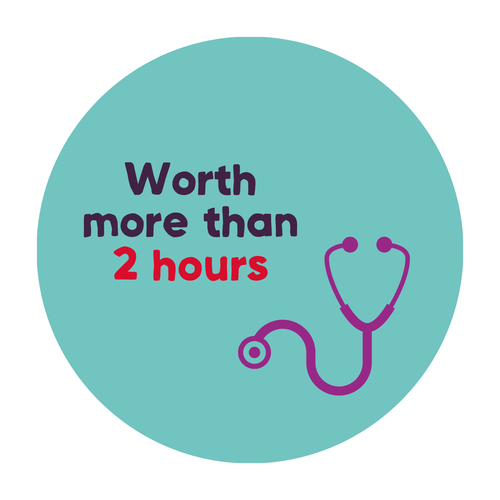Worth More Than 2 Hours

Research has shown that, on average, UK undergraduate medical students receive less than two hours of teaching on eating disorders, throughout their entire medical degree. Even more concerningly, 20% of medical schools do not include eating disorders at all in their teaching. Given that 1.25 million people in the UK suffer from an eating disorder, and around 5% of the population will be affected at some point in lifetime, this is something that needs to change.
I saw a patient in clinic, she had been known to psychiatric services for about 35 years. All it took was their initial presentation for me to realise that she had an eating disorder and she had done for all this time. I was so shocked and appalled that no-one had been asking these questions. It really got to me, because it’s in the same way that I had also been missed.

Eating disorders are highly complex mental illnesses, but they are treatable. Just two hours of training is not enough time to equip medical students with the knowledge to identify the physiological and psychological signs and symptoms and provide the necessary interventions to help sufferers access the most appropriate treatment at the earliest opportunity.
My daughter was sent away after the first appointment to come back in six months. She deteriorated. We returned after five months and were then sent away for another month…On the third appointment he realised how serious things had become and she saw a specialist in two days. But what price the delay?
We know there are some fantastic medical practitioners out there and we want every person who presents with an eating disorder to experience this high-quality care. We are campaigning to ensure that every new doctor completes their training with the knowledge and skills to best support someone with an eating disorder, whatever area of medicine they work in.
My daughter has not fully recovered but [if it wasn’t] for GP care she might not be alive at all. The care shown by our GPs to the whole family has been exemplary.
What you can do
We need every doctor, including our GPs, to have the knowledge and skills to identify and support someone with an eating disorder. We're continuing our work with medical schools to support them to cover these complex illnesses fully in their curriculum, but we need your help to spread the message to GPs.
In collaboration with Health Education England, we’ve developed a free course that equips all UK GP surgeries with the knowledge to spot the signs of an eating disorder. Tell your GP surgery about the course today!
Contacting a medical school
Raise this campaign with a medical school directly, to let them know how vital increasing training on eating disorders is.
UK Medical Schools: Training Status
We have contacted all medical schools in the UK to assess whether they are delivering effective education on eating disorders to their students.
The campaign so far
2017-2022
February 2017 - GP petition
Petition launched to call for increased training on eating disorders for future GPs.
December 2017 – PHSO Report
‘Ignoring the Alarms: How NHS eating disorder services are failing patients’ report published. The investigation found multiple failings in patient care, and gave five recommendations for national improvement, including highlighting the need for improvements in the training of doctors and other medical professionals about eating disorders.
June 2018 – Medical training petition
Research found that the total number of hours spent on eating disorder teaching in UK medical schools is less than two hours. Informed by this and the PHSO report Beat widens the scope of the campaign and launches a petition calling for increased training for all medical students and junior doctors.
Campaigner win (June 2018)
Beat Campaigner Emily was successful in her lobbying of UCL medical school to increase teaching on eating disorders. She said of her success: “I can’t tell you how much this win means to me. Knowing that my work will lead to more trained doctors, and therefore more early diagnoses, makes me even more motivated to tackle the next medical school on my list!”
March 2019 – Roundtable in Parliament
The General Medical Council and Baroness Parminter held a roundtable meeting in the House of Lords to discuss eating disorders in medical training. Those attending heard from people with lived experience of an eating disorder, and there was discussion about how the attendees could collaborate in the future.
June 2019 – PACAC inquiry
18 months on from the publication of the ‘Ignoring the Alarms’ report, an inquiry was launched to highlight the report’s findings and investigate what progress had been made in implementing the recommendations.
2019/2020 – New training package developed
As part of the PACAC’s inquiry recommendations, a collaboration between Health Education England, the Royal College of Psychiatrists and Beat leads to the production of a new training package for medical students and foundation years.
March 2021 - Regulation 28: Report to Prevent Future Deaths published
This report raised concerns about the wide-spread and continuing lack of training, knowledge, or experience on the part of physicians and medical staff regarding eating disorders and called for action to be taken.
April 2021 – Training package launched
New training package for medical students and foundation years is finalised and the resources will be made available free of charge to all medical schools and foundation training schools.
2021/2022 - Training package promoted to medical schools
All medical schools are contacted to raise awareness of the importance of effective training on eating disorders for all doctors, and promote the free training package.
February 2022 – Eating Disorders Awareness Week 2022
The campaign is the focus of Eating Disorders Awareness Week 2022. An open letter to all UK medical schools is launched and information about training provided at medical schools is published.
Resources and further reading
Ignoring the alarms: How NHS eating disorder services are failing patients
Parliamentary and Health Service Ombudsman Report (2017)
Ignoring the Alarms follow-up: Too many avoidable deaths from eating disorders
House of Commons Public Administration and Constitutional Affairs Committee Report (2019)
Does the UK medical education provide doctors with sufficient skills and knowledge to manage patients with eating disorders safely?
Agnes Ayton, Ali Ibrahim (2018)